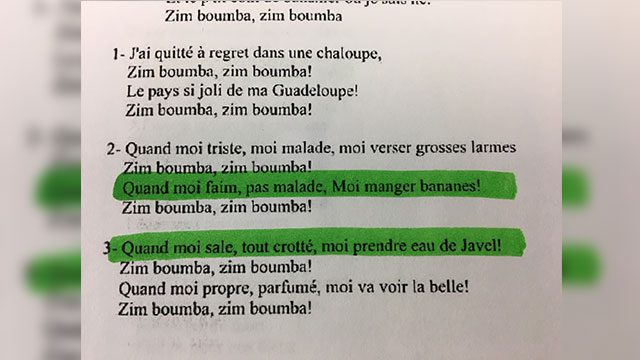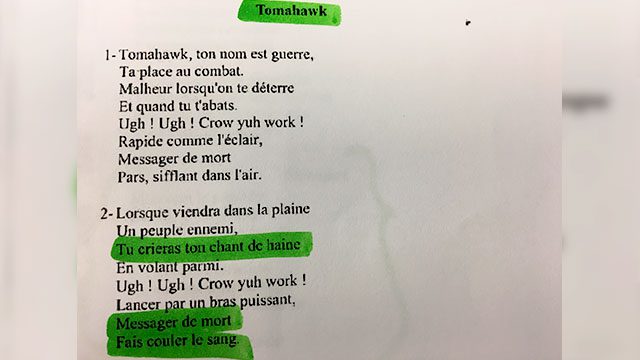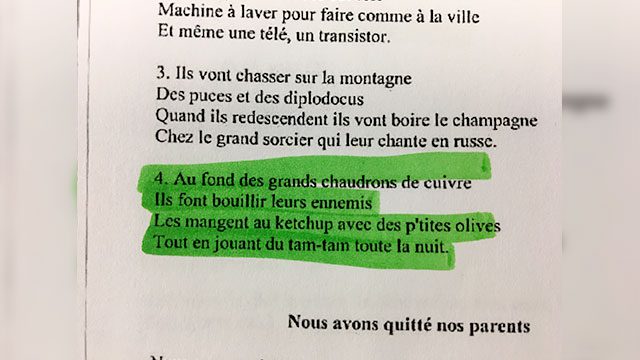Kidnapping. Cannibalism. Murderous savages. Black children eating bananas before bleaching their skin: these aren’t your typical campfire sing-along songs.
But the very real – and very concerning lyrics – were all found in “Chansons Cigalou,” a Scouts songbook published and used by the 212e Troupe Ste-Bibiane, based in the Rosemont neighborhood of Montreal.
Back in March, a Haitian mother was alerted to the controversial song choices when her daughter, one of two black children in the troupe, came home distressed.
At camp, they were learning a song called “Le Petit Negro” (The Little Negro); its primitive-sounding language and pandering to time-worn racial stereotypes caused immediate concern.
Translated, the song goes like this: “When me hungry, not sick, me eat bananas/ Zim boumba, zim boumba!/When me dirty, all filthy, me use Javel (bleach) water/ Zim boumba, zim boumba!”
(“When me sad, me sick, me cry big tears/Zim boumba, zim boumba!/When me hungry, not sick, me eat bananas/Zim boumba, zim boumba!/ When me dirty, all filthy, me use Javel (bleach) water/ Zim boumba, zimboumba!/ When me clean, perfumed, you’ll see I’m pretty/Zim boumba, zim boumba!)
When the mother contacted senior officials at L’Association des Scouts du Canada – a French-language organization unaffiliated with the more widely-known Scouts Canada – the mother was allegedly told she was “oversensitive,” and trying to be politically correct.
In another instance, she was told that if every song was considered objectionable, there wouldn’t be anything left to sing.
“This is supposed to be the Scouts movement – open to the world, open to diversity, respectful of – among other things – human rights and human values,” explained Fo Niemi, executive director of the Centre of Research and Race Relations, a non-profit organization that provides support and resources to Montrealers looking to make public complaints about systemic racism.
Niemi says they’ve been following the case – and the lack of response to it – for a couple of months.
He was appointed spokesperson for the case after the mother, who works in the French education system, opted to remain anonymous out of fear there would be repercussions for herself and her daughter.
“We feel that this whole booklet, this songbook taken as a whole, basically perpetuates a lot of negative racial stereotypes of different people,” Niemi explained.
“Firstly we didn’t believe it, until we saw the songbook and we realized ‘we have a big problem,’” he added.
(The first stanza of the song Tomahawk says “your name is war, your place in combat. The second stanza is slightly more alarming: “When they come in the plains/ an enemy people/ you’ll shout your chant of hate/while flying towards them/Ugh! Ugh! Crow yuh work!/ Thrown by a strong arm/Messenger of death/Making blood run”)
One song called “Zimbaboue” makes reference to bringing home a “little dark-skinned friend” as a souvenir from Africa to replace a white child eaten by cannibals.
“Mahomet” openly ridicules the prophet Muhammed.
Some songs use gibberish in place of foreign languages or cultural chants.
First Nations are also targeted in a handful of ‘Cigalou’s’ songs.
“Tomahawk,” for example, makes reference to Indigenous peoples shouting their “songs of hate” towards an oncoming enemy, calling them “messengers of death [who] make blood run.”
In another, Indigenous people are also presented as cannibals, boiling their enemies in copper pots before eating them “with ketchup and little olives” all the while “playing tam-tams through the night.”
“This is supposed to be the Scouts movement – open to the world, open to diversity, respectful of – among other things – human rights and human values,” Niemi said.
(“At the bottom of big copper pots/ they’ll boil their enemies/ They’ll eat them with ketchup and little olives/all while playing tam-tam through the night.”)
Scouts Canada confirmed they are continuing to receive heated messages about the songbook, and were quick to denounce its existence.
“Please note that l’Association des Scouts du Canada and Scouts Canada are two separate, independent organizations,” Scouts Canada wrote in a Facebook post. “Scouts Canada neither uses, nor approves of such program materials as mentioned [here].”
A senior official from l’Association des Scouts du Canada finally promised action; however, a follow-up email sent by the mother last month went unacknowledged.
The association has not communicated directly with CRARR after the story was made public, according to Niemi.
But when contacted by APTN News, there was a slightly different message.
“The association is indignant at the distribution of a collection of songs containing racist remarks within its group of young Scouts, and apologizes to all those who have been offended by the nature of certain content,” a spokesperson said in an email statement. “The Cigalou collection of songs is an independent, isolated, unfortunate, and reprehensible work. It is not part of the animation and singing materials provided to managers of Scouts groups and units.”
(“I am the big Indian chief, yah!/I come from far, far away, yah!/ Sometimes I roll in the hay/ I lose my moccasins/ But that doesn’t bother me, yah!”)
The book has officially been pulled from circulation in order to “protect the youth and assure that no other incident of this type manifests.”
Thing is, no one really knows how the collection made it to print.
According to the same spokesperson, while the French branch of Scouts does have standardized learning tools, “groups are free to add documentation at their discretion.”
An internal investigation is now underway within the 212th troupe, and all leaders have reportedly been ordered to undergo sensitivity training.
But Niemi says he’s wary of the promises made.
“We’ll believe it when we see it,” he said. “We don’t know what the quality of the training will be, who will do the training.”
Meantime, the mother and Niemi have filed a complaint with Quebec’s Human Rights Commission alleging racism, and seeking $10,000 in damages.
“Scouting and human rights usually go together,” he said. “And this is more than just a slip up on the part of the group leader.”
“This is basically institutional resistance to, and insensitivity to racism and complaints of racism.”













As a Scouter with Scouts Canada I am surprised songs of that nature would make it in a Scouts du Canada song book, and wonder why any Section Scouter would wait for parents to complain about such negative songs to realize they shouldn’t be taught to children or anyone for that matter. Disgusting!